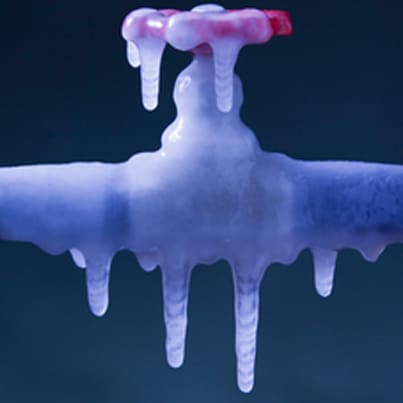You and your home have ridden out one of the coldest nights of the year; the weather is warming when suddenly you hear water running inside a room. It’s a burst pipe, which can lead to substantial damage in your home.
How much damage can a broken pipe cause? The Federal Emergency Management Agency estimates that just two inches of water can cause more than $10,000 for repairs and replacement of flooded items. Six inches of water can add up to more than $30,000.
While frozen pipes are most common in northern and mountainous areas of the country, they can occur anywhere when a major polar front hits. Homes from California to Florida have suffered water damage from broken pipes after spells of severe cold.
So before the thermometer plunges, here are things the American Red Cross advises you do to prevent pipes from freezing:
- Disconnect outside hoses from faucets
- Insulate water pipes, especially along exterior walls and unheated areas
- Add insulation to walls and attics where pipes may run
Once the sub-zero weather hits you should:
- Let faucets drip to prevent freezing
- Keep the thermostat above 55 degrees
- Make sure garage doors are closed
- Open kitchen and bathroom cabinets to allow warm air to circulate around plumbing
So you’ve prepared and kept as much heat as possible going to cold areas, but the cold air still froze a pipe; what now? Stay calm but act as quickly as possible to:
- Locate where the pipe is frozen
- Open the nearest faucet to relieve pressure when the ice thaws
- Slowly warm the pipe with a heating pad, hair dryer, space heater or wrapping it with hot towels – never use a blow torch or open flame
If the pipe has cracked or broken, immediately turn off water at the main water valve and call a plumber. Shutting off the water will prevent further damage.
Once a pipe freezes, odds are it will happen again. Here are some tips to prevent it in the future:
- Hire a plumber to relocate to a warmer area
- Add more insulation in walls, attics and crawl spaces
- Wrap the pipe with electric heat tape, when temperatures drop, plug it in
Remember, if a burst pipe sends water into your home, contact a California Casualty Claims advisor as soon as possible; we can help get you started on the clean-up.
And before the next cold front hits, call a California Casualty advisor for a free auto or home insurance policy comparison and review to make sure you are protected against winter’s fury, 1.800.800.9410.
Sources for this article:
https://home.costhelper.com/water-leak.html
https://www.floodsmart.gov/floodsmart/pages/flooding_flood_risks/the_cost_of_flooding.jsp
https://www.redcross.org/prepare/disaster/winter-storm/preventing-thawing-frozen-pipes
This article is furnished by California Casualty, providing auto and home insurance to teachers, law enforcement officers, firefighters and nurses. Get a quote at 1.800.800.9410 or www.calcas.com.
- California Casualty Earns Financial Stability Rating® of A, Exceptional, From Demotech, Inc. - April 28, 2025
- Music & Arts Grant Recipients – 2024 - December 13, 2024
- Understanding Auto and Home Insurance Rate Changes - December 3, 2024

